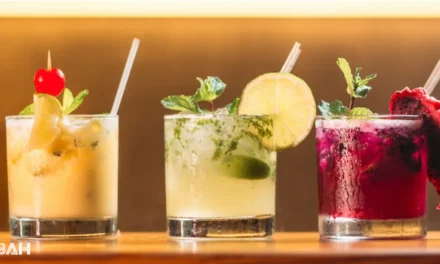Soy sauce is a popular condiment used in many cuisines around the world. However, for those following a halal diet, the question often arises – is soy sauce halal or haram? With soy sauce being made from soybeans and wheat, it would seem that soy sauce is halal. But since some soy sauce contains traces of alcohol from the fermentation process, its halal status may come into question.
In this comprehensive guide, we’ll cover everything you need to know about soy sauce and halal – from how traditional soy sauce is made, the different types of soy sauce, whether soy sauce contains alcohol, and how to find halal certified soy sauce brands. Read on to get the full scoop on whether soy sauce is halal or haram!
How Is Traditional Soy Sauce Made?
To understand whether soy sauce is halal or not, it’s important to first look at how traditional soy sauce is produced. Authentic soy sauce starts with soybeans and wheat that are cooked, crushed, and mixed with a mold culture called koji. This mixture then undergoes fermentation and is blended with brine to become soy sauce.
The key step is the fermentation process. As the koji mold breaks down the soybeans and wheat, alcohol is produced as a by-product. This is why some soy sauces contain traces of alcohol, ranging from 0.5% to 3% typically.
“The fermentation process is critical to developing the rich umami flavor and aroma of soy sauce,” explains Lee Kum Kee’s master soy sauce brewer Chan Siu Kei. “As the koji mold cultures break down proteins and carbohydrates, natural alcohol is created.”
The entire process of making traditional soy sauce can take months or even years, depending on factors like climate and desired flavor profile. But this long fermentation time is what gives soy sauce its signature savory-sweet taste that we all love.
What Are the Different Types of Soy Sauce?
While traditional soy sauce uses fermentation and contains traces of alcohol, there are also types of soy sauce made without fermentation or alcohol through chemical hydrolysis of soybean and gluten meal.
Some of the main varieties of soy sauce include:
-
Regular (koikuchi) soy sauce: This is the most common type of naturally brewed soy sauce. It contains some alcohol from fermentation, usually around 1-3%.
-
Low-sodium or “lite” soy sauce: A low sodium version of regular soy sauce with less salt, around 10-15% reduced.
-
Tamari: A wheat-free soy sauce made with just soybeans and salt. Often used for gluten-free diets.
-
Shoyu: The Japanese word for soy sauce. Tends to be slightly sweeter and more umami.
-
Chemical/non-brewed soy sauce: Made through hydrolyzed vegetable protein instead of fermentation. Contains no alcohol.
Comparison of Soy Sauce Types
| Type | Ingredients | Alcohol Content | Notes |
|---|---|---|---|
| Regular/Koikuchi | Soybeans, wheat, salt | 1-3% | Most common type |
| Low Sodium | Soybeans, wheat, salt | 1-3% | Lower salt taste |
| Tamari | Soybeans, salt | 0% | Wheat-free |
| Shoyu | Soybeans, wheat, salt | 1-3% | Sweeter taste |
| Non-Brewed | Soy protein, salt | 0% | No fermentation |
As you can see, both tamari and non-brewed varieties contain no alcohol at all, making them the best halal soy sauce options.
Does Kikkoman Soy Sauce Contain Alcohol?
Since traditional soy sauce involves a fermentation process, it does contain a small amount of alcohol. Regular soy sauces can contain alcohol ranging from 0.5% to 3%.
However, there are also non-brewed soy sauces made through chemical hydrolysis instead of fermentation. These varieties contain no alcohol at all.
Examples would include:
- Kikkoman Less Sodium Soy Sauce
- Kikkoman Naturally Brewed Soy Sauce
- La Choy Lite Soy Sauce
Muhammad Munir, an Islamic studies professor, explains that “Chemically hydrolyzed soy sauces have no alcohol content at all, making them halal. But traditionally brewed soy sauce does contain some alcohol from the fermentation process.”
So in summary, traditionally brewed soy sauce does contain some alcohol content from the production process. But there are also non-brewed varieties available with no alcohol for those avoiding it in their diet.
Is Soy Sauce Halal or Haram?
Given that some soy sauces contain trace amounts of alcohol, is soy sauce halal or haram then?
According to many Islamic scholars, soy sauce is considered halal and permissible to consume in Islam. This is because the alcohol content in traditionally brewed soy sauce is very low and considered “negligible.”
Additionally, the alcohol is not added as an ingredient itself. It occurs as a byproduct of the natural fermentation process. The soy sauce itself is not intoxicating or consumed as an alcoholic beverage.
For these reasons, most varieties of soy sauce are generally regarded as halal. Some additional considerations:
-
Check for halal certification on the soy sauce bottle when available. This guarantees it meets halal standards.
-
Tamari wheat-free soy sauce and chemical hydrolyzed soy sauces contain no alcohol at all.
-
Avoid using cooking wines, liquors, and other haram alcohols when cooking with soy sauce.
But as with any gray area ingredient, it’s best to consult your local religious authority if still unsure whether consuming soy sauce is permissible.
Imam Malik Kaliq, a halal diet advisor, advises: “For those wanting to strictly avoid alcohol, look for tamari or non-brewed soy sauce. And as always, check for halal certification marks when possible to be 100% certain.”
How to Find Halal Soy Sauce Brands
When looking for halal certified soy sauce, some good brands and varieties to look for include:
-
Kikkoman Less Sodium Naturally Brewed Soy Sauce: Kikkoman is one of the most popular soy sauce brands worldwide. Their less sodium soy sauce is halal certified in many regions like the USA, Canada, Singapore, Malaysia, and more.
-
Kikkoman Gluten-Free Soy Sauce: For a wheat-free tamari style soy sauce, Kikkoman also offers halal certified gluten-free soy sauce.
-
Meira or Good Brand Soy Sauce: Look for halal certification marks on brands like Meira or Good Brand soy sauce, often found in Middle Eastern grocers.
-
Amoy Soy Sauce: Many Amoy soy sauces are halal certified and imported from China/Hong Kong. Excellent for Asian cuisine.
-
Golden Mountain Seasoning Sauce: This Thai soy sauce substitute contains no alcohol during production.
When in doubt, look carefully at the ingredient list and packaging for halal certifying symbols like the Muslim Consumer Group’s M inside a crescent logo. This indicates the product has been vetted for halal standards.
Shopper Tip: When browsing the aisles, look for phrases like “non-brewed” or “no alcohol” on the label to quickly identify halal-friendly soy sauce alternatives.
Frequently Asked Questions – Is Soy Halal?
Soy sauce can be halal if it is made without any haram ingredients like alcohol. There are various types of soy sauce available, both halal and non-halal. It’s important to check the ingredients and halal certification of the soy sauce brand you are considering.
What is halal soy sauce?
Halal soy sauce refers to soy sauce that is produced according to Islamic dietary laws and does not contain any haram substances. Halal soy sauce is typically made using halal ingredients and is certified by a trusted Islamic authority.
Is Kikkoman soy sauce halal?
Kikkoman soy sauce does not have a halal certification. While it does not contain any haram ingredients, it is still recommended to use soy sauce with a halal certification to ensure compliance with Islamic dietary laws.
Can soy sauce be considered halal?
Whether soy sauce is considered halal or not depends on the ingredients used in its production. While some soy sauces are halal, others may contain haram ingredients, such as alcohol or non-halal additives. Always check the label or look for a halal certification.
What are the types of soy sauce?
There are different types of soy sauce, including light soy sauce, dark soy sauce, and traditionally brewed soy sauce. It’s important to note that not all types of soy sauce are halal, so check the ingredients and certification to ensure it meets halal requirements.
Can soy sauce be considered haram?
Soy sauce can be considered haram if it contains haram ingredients, such as alcohol or non-halal additives. It’s crucial to read the labels and look for halal certification to confirm the halal status of the soy sauce.
Is there alcohol in soy sauce?
Some soy sauces may contain alcohol as a preservative or flavoring agent. However, there are also alcohol-free soy sauces available. If you follow a halal diet, make sure to choose soy sauce without alcohol or look for halal-certified options.
What is the process to make soy sauce?
Soy sauce is made by fermenting soybeans with the help of molds or bacteria. The process involves cooking the soybeans, mixing them with roasted wheat or other grains, and allowing fermentation to occur. This mixture is then pressed to extract the liquid, which is soy sauce
Conclusion
To wrap up, here are 5 main points to remember when it comes to the question of whether soy sauce is halal or haram:
-
Traditionally brewed soy sauce contains some alcohol from the fermentation process. But chemical hydrolyzed soy sauce has no alcohol content.
-
Most soy sauce today is considered halal and permissible to consume by many Islamic schools of thought, due to its low alcohol traces.
-
Check for halal certification on the packaging when available to guarantee halal standards.
-
Tamari and low sodium varieties of soy sauce tend to be alcohol free.
-
Popular halal certified soy sauce brands include Kikkoman, Meira, Amoy, and many others.
So is soy sauce halal or haram? For most Muslim consumers, soy sauce is generally regarded as halal and fine to use in moderation. But be sure to inspect labels and verify halal status if following a strict halal diet.





